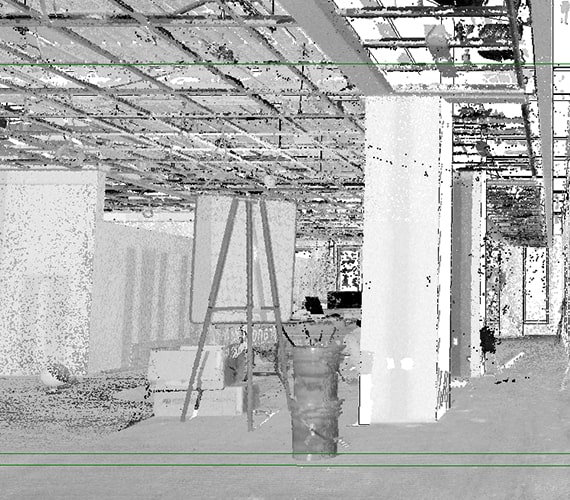Streamlining Survey, Reconstruction & Documentation
At TopBIM Company, we understand the importance of accuracy and precision when it comes to building projects. That’s why we use the latest 3D laser scanning technology to provide you with the most accurate and detailed measurements possible. Our team of experienced professionals ensures that every project is completed with the highest level of quality and attention to detail.
Our 3D laser scanning services are designed to provide you with a comprehensive view of your building project. We use cutting-edge laser scanners to capture high-resolution images and detailed point clouds of your project site. This allows us to create accurate 3D models of your building, which can be used for a wide range of applications.
TopBIM Company’s skilled laser scan technicians use survey-grade Leica laser scanners, which are at the forefront of the industry, to gather millions of accurate data points for a structure or site.
With the help of each client, our team of in-house engineers, architects, and CAD designers develops unique deliverables that support any project’s design, planning, and execution phases.
TopBIM completes over 500+ projects annually and has developed a reputation for providing top-notch service on time and within budget.

For accurate and detailed measurement and building documentation
There are several types of 3D laser scanning services, each with its own specific applications and benefits. Here are some of the most common types of 3D laser scanning services we provide:
Documentation of the actual state of a building
Physical dimensions of the surfaces of buildings and objects
To capture the details of an existing building or construction site
A full 3D virtual environment to help in future decision
To evaluate the integrity of the structure in place
A virtual replica of a physical building or construction project
To capture data on existing structures, equipment, utilities
To repair or restore building structures to a better condition
With the use of 3D laser scanners, precise point cloud data is gathered. Scanner provide quick scanning, accurate data, time savings, and steady support.
The appropriate BIM software is used to import the gathered data and create models. Documentation becomes data-driven, rapid & secure, and simple to use, providing realistic results.
The point cloud data is transformed using computer programs into an extensive BIM model. Construction delays are reduced and the design process moves more quickly by integrating 3D building scanning into the BIM model.
Once complete, the 3D BIM model is delivered to the client in the required format. You can export survey data in a comprehensible manner.
There are numerous benefits to using laser scanning services for a wide range of industries and applications. Here are some of the key benefits:
Outsourcing 3D laser scanning services enable quick capture of landscape areas, buildings, factories and building objects.
A 3D laser scanner’s quick data capture speed makes it possible to record millions of data points in a matter of seconds. Using quick 3D laser surveying services make it perfect for working on time-sensitive projects where a quick turnaround is essential.
Trusted by renowned construction companies, architects, design-build firms and AEC professionals.
Scan to BIM experts have the knowledge of the many state building regulations in the USA & deliver projects on time without much hassle.
Data-driven documentation and maximum precision.
Working with improved technology to manage challenging & complex BIM needs.

Depending on the amount of precision, the location, and the distances scanned, the majority of scanning applications require 1.5 to 8 minutes per scan. A site could need a few to hundreds of scans.
The accuracy of 3D laser scanning can vary depending on several factors, including the specific type of laser scanner used, the environment being scanned, the complexity of the object being scanned, and the level of expertise of the technician operating the scanner. However, in general, laser scanning is known for providing highly accurate and precise data.
Laser scanners can capture millions of data points per second, allowing for extremely detailed and accurate representations of the object or environment being scanned. The accuracy of 3D laser scanning is typically measured in terms of the distance between each data point, or point cloud, captured by the scanner. This distance can range from a few millimeters to less than a micrometer, depending on the scanner's specifications.
3D laser scanning is used in a wide range of industries and applications for capturing detailed measurements and creating highly accurate 3D models. Here are some of the most common uses of 3D laser scanning:
Engineering and Manufacturing: 3D laser scanning is used for quality control, inspection, reverse engineering, and prototyping in engineering and manufacturing industries.
Architecture and Construction: 3D laser scanning is used for building documentation, as-built surveys, and creating 3D models of buildings and structures.
Cultural Heritage and Archaeology: 3D laser scanning is used for preservation and restoration of historical and cultural artifacts and structures.
Entertainment and Media: 3D laser scanning is used for creating 3D models of characters and environments for movies, video games, and other forms of entertainment.
Medical and Dental: 3D laser scanning is used for creating highly detailed models of patients' body parts for medical and dental procedures.
Forensics and Law Enforcement: 3D laser scanning is used for documenting and analyzing crime scenes and accidents.
The price of a point cloud scanner can vary greatly depending on the specific model, features, and manufacturer. Generally, handheld scanners can range from a few hundred dollars to several thousand dollars, while larger stationary scanners can range from tens of thousands to hundreds of thousands of dollars.
The cost of 3D scanning services also varies depending on several factors such as the type of object or environment being scanned, the level of detail required, and the location of the project. The complexity of the scanning process and the expertise of the technicians performing the scan will also affect the cost. As such, it's difficult to provide a specific price range without more information about the project.
Generally, 3D scanning services can cost anywhere from a few hundred to several thousand dollars per project. For example, a small object scanning project with low complexity may cost around $500, while a larger project requiring high accuracy and detail could cost upwards of $10,000 or more. It's best to contact a 3D scanning service provider and request a quote for your specific project to get a more accurate estimate.
A 3D laser scanning survey is a non-invasive method of capturing highly accurate 3D data about an object, structure, or environment. During a 3D laser scanning survey, a laser scanner emits a beam of light that reflects off the surfaces of the object or environment being scanned. The scanner records the time it takes for the laser beam to travel to the object and back, which allows it to calculate the distance to each point on the object's surface. By capturing millions of these measurements, the scanner creates a highly detailed 3D point cloud that can be used to create 3D models or perform various analyses.
3D laser scanning surveys are used in a wide range of applications, including engineering and construction, architecture, archaeology, cultural heritage preservation, forensics, and many more. By capturing highly accurate 3D data, 3D laser scanning surveys allow for more detailed and accurate documentation, analysis, and visualization of objects and environments than traditional survey methods. They can also be performed quickly and non-invasively, reducing the need for physical contact with the object or environment being surveyed.
The cost of 3D scanning services also varies depending on several factors such as the type of object or environment being scanned, the level of detail required, and the location of the project. The complexity of the scanning process and the expertise of the technicians performing the scan will also affect the cost. As such, it's difficult to provide a specific price range without more information about the project.
Generally, 3D scanning services can cost anywhere from a few hundred to several thousand dollars per project. For example, a small object scanning project with low complexity may cost around $500, while a larger project requiring high accuracy and detail could cost upwards of $10,000 or more. It's best to contact a 3D scanning service provider and request a quote for your specific project to get a more accurate estimate.